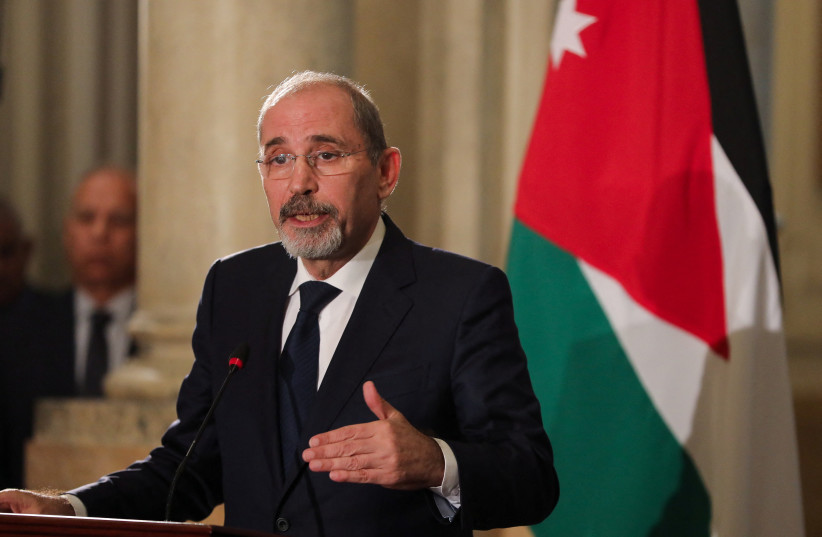In the midst of this four-front war with no clear end date in sight, Jordanian Foreign Minister Ayman Safadi recently proposed:
“All of us in the Arab world here [members of a committee mandated by 57 Arab and Muslim countries] want a peace in which Israel lives in peace and security, accepted, normalized with all Arab countries in the context of ending the occupation, withdrawing from Arab territory, allowing for the emergence of an independent, sovereign Palestinian state on the June 4, 1967, lines with east Jerusalem as its capital…”
The question is, what should Israel do with such a statement at this particular time? It will clearly be rejected by many voices for many different reasons.
The land Safadi mentions is the biblical heart of Israel and can never be given back. Returning that land will put Israel at serious security risk.
The Arabs rejected division of the land in 1937, 1948, 2000, and 2008 – they will not agree to it this time, so entertaining this offer is a waste of time that will only put Israel in a more precarious global political reality.

To agree now to such a proposal only rewards Hamas, Hezbollah, the Houthis, and Iran when it comes to terrorism.
The current environment, after this past annus horribilis with so much shock, heartache, pain, devastation, and grief, is absolutely not the time to contemplate what the acceptance of Safadi’s offer would mean.
All of these reasons to reject what the Jordanian foreign minister proposed need to be considered. Not to mention that Safadi also said, “Israelis, what’s their narrative other than I’m going to continue to go to war, I’m going to kill this and kill that and destroy this and that.”
How can someone be trusted who so quickly dismisses Israel’s right to defend itself in the wake of the horrors that were inflicted on it on October 7, or the years of attacks by Hezbollah in the North, which is now uninhabitable for 60,000 Israeli evacuees? Not to mention the firing of ballistic missiles by Iran at Israel.
Can we take this olive branch seriously?
Having said all that, can we take Safadi’s olive branch with any degree of seriousness? We need to step back and see the present in a broader historical arc.
There is a clear line from the brutal massacre of the Hebron Jewish community in 1929 and the atrocities committed on October 7.
In between, there has been the massacre of the Hadassah medical convoy in 1948, the Israeli Olympic athletes in Munich in 1972, the schoolchildren in Ma’alot in 1974, and the suicide bombings over the decades. That is to say, Israel has been on the receiving end of the murder of innocent civilians for a century now. Why?
It was perhaps said most succinctly by David Ben-Gurion in 1936 about the local Arab Palestinian population: “It is inconceivable that a people would choose to become a minority.” That too often and for far too long Palestinians have chosen terrorism as a tactic only convinces more and more Israelis that Palestinians cannot be trusted and have no real desire to live in peace.
Conflict resolution theorist Johan Galtung teaches that when we only deal with violence, we create what he calls a “negative peace,” since the violence will come back.
Only when we also deal with the causes of the conflict will we obtain a positive peace to break the cycle – the decades, in this case, of Israeli and Palestinian blood being shed.
There is no question that we need to forcefully address violent attacks on Israelis and the Jewish state. But, as Galtung astutely explains, it only leads to a negative peace.
So how can we get closer to that positive peace and address the cause of the conflict without diminishing the need to focus on the symptom of the conflict – in this case, the violence?
They do not need to be viewed as mutually exclusive. The challenge is that in the immediacy and necessity to respond to or preempt violent assaults, addressing the causes of a conflict is often pushed aside, which may lead to quiet, but it will only be temporary, as Galtung points out. Israel and all of its neighbors deserve a better future.
This leads us back to the recent statement by the Jordanian foreign minister. His statement goes to the intractable cause of this century-long conflict – the 2,000-year-old homecoming for the Jewish people pushing up against the local Palestinian population becoming a minority.
Questions can be raised about Safadi’s overture, as mentioned above. But at the end of the day, he has opened an opportunity to face, at this moment, the causes of this 100-year-old conflict.
Yes, Iran and its proxies want to see Israel wiped off the map. But if there are 57 Arab and Muslim countries willing to live in peace with Israel, it’s not something to dismiss out of hand.
It is worth noting the wording of the psalmist: “Seek peace and pursue it” (Psalm 34:14). It says that our Jewish value is to “seek” and “pursue” peace. It does not say we will succeed each and every time, but it does say we must seriously explore and examine every opportunity that comes our way.
These words are not written lightly, but they are written with the guidance of that powerful Jewish value to “seek peace and pursue it,” even during a painful time of war.
The writer is a Reconstructionist rabbi emeritus of the Israel Congregation in Manchester Center, Vermont. He teaches at the Arava Institute for Environmental Studies on Kibbutz Ketura and at Bennington College. The views expressed are those of the writer and do not necessarily reflect the views of any organization with which he is affiliated.
